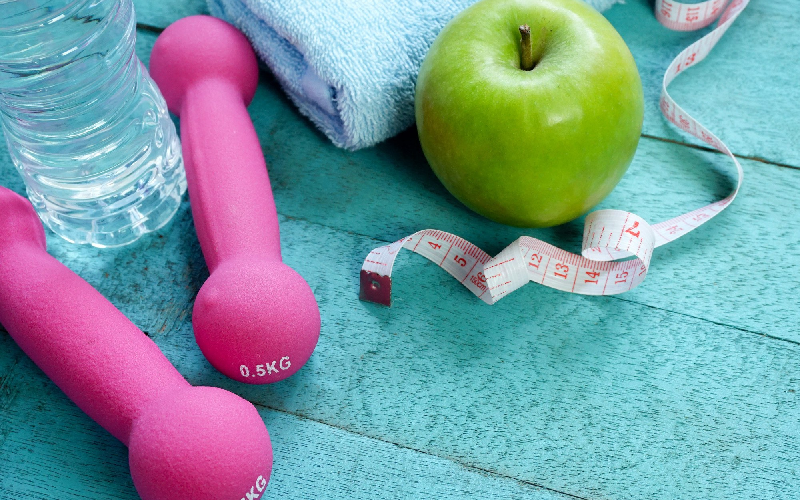
When daylight starts to fade, and your travels both to and from work are in the dark, your mood can take a serious hit — not to mention the fact that you’re surrounded by sniffling strangers on transit as well as ill coworkers. That doesn’t mean you can’t be your best self all winter long. Here are some tips to help get you through the winter happy and healthy, as well as carry on into the other seasons for year round health and wellness.
Contents
Start the Day With a Feel-good Routine
When you wake up, take a few moments for yourself before you reach for your phone. Deep breathing is proven to make you more calm and relaxed, and even boosts epinephrine, the counter chemical to adrenaline. An easy way to do this is by inhaling through your nose for four seconds; holding your breath for a count of seven, and then exhaling completely through your mouth to a count of eight.
Try diffusing essential oils around your home for another quick boost. The olfactory bulb in the nose transmits information to our brains, which is why pleasant smells can help improve mood. Some have a preference for frankincense, while Harvard University found that the scent of lemon oil in particular enhances mood. So, if you love your morning showers, opting for a citrus-scented body wash and shampoo can give you that extra pick-me-up.

Get the Right Amount of Sleep
The amount of sleep each person needs is dependent upon the individual, but for the average adult, one needs between seven to nine hours of sleep per night. To some, this may be a lot, and to others, it’s not enough. It’s all dependent upon the person, so try sleeping for different lengths of time until you figure out what works best for you; you can even try a sleeping app that monitors your sleep for you. That might mean less than seven or more than nine hours, but what matters is that you do what is right for your body.
In addition to getting the right amount of sleep, if you’re not getting enough or are having trouble falling asleep, high-THC strains of medical cannabis may be the answer for you to get a full night’s rest. THC connects to the cell receptors in the brain that deal with the sleep cycle which is what makes it so great for sleep issues. Another option is to include a short meditation routine in your day to give you calmness at night.
Even if you hit the sheets at 9 p.m. on the dot, the wrong bedroom setup could lead to a lack of Zs. That’s where sleep hygiene comes in: practices and habits that lead to good nighttime sleep quality and full daytime alertness. Sleep.org points to four important factors that are key to helping you achieve this: A comfortable, supportive mattress; a cool temperature (60 to 65 degrees) in the bedroom and black-out curtains or a good eye mask to prevent light from creeping in.
Before winding down for bed, write down the next day’s to-do list. Often when we wake up at night, our minds review these lists, but if you wake up and say ‘I’ve already dealt with that list and I’ll get to it tomorrow,’ you’re less likely to have a racing mind keep you awake.
If you have a hard time putting your phone down 60 to 90 minutes before bed, put on blue blockers — yellow glasses that block blue light — to help kick-start melatonin, the nighttime-cycle hormone.
Still keep waking up out of your sleep? Brighter Health recommends that you try listening to white noise — the constant ambient sound can help mask activity from inside and outside your bedroom. Or try pink noise, which has a lower, steadier frequency. Some people prefer brown noise, which is even deeper and stronger, with no high-frequency sounds. Daytime naps could be to blame, too — research shows sleeping longer than 20-30 minutes could lead to sleeplessness at night.
Embrace Exercise
Again, this can be a hard one to get behind. Even so, it’s not as bad as you think. Just start small: workout within your means. Though it’s recommended to workout three to five times per week for 45 to 60 minutes per day, you don’t have to start out there. Start with one day a week, then two and build your way up. Even easier, try just 150 minutes of “moderate activity” per week. This is a very feasible goal that everyone should set for themselves whether by just walking or jogging.
The two main recommended methods for exercise are weight training and cardio. If you want to mix things up (which is encouraged in the world of fitness), you can also try HIIT (High Intensity Interval Training) — research has shown that HIIT is beneficial. While this is a bit more intense and may not be for the beginner, HIIT combines cardio with an entire body workout; a great bang for your buck in the world of fitness. Also, make sure to vary your types of exercise to stay fit in all the important ways.
Important to note is that you need to listen to your body. Everybody is different, so while there may be recommended modes of exercise and intervals of time to workout, your body may need something else. If you’re feeling like anything is off, check with your doctor about what it may mean for you. If you ever experience pain or discomfort from working out, certain strains of medical cannabis may be used to relieve pain and tension and are certainly a viable option to ensure nothing gets in the way of your fitness.
Eat Plenty of Feel-good Foods
Starting your day with oatmeal doesn’t just warm you up before you head out into the cold: Oats are a great source of B vitamins, which help energize you, and tyrosine, an amino acid that helps your body produce feel-good chemical dopamine. Not a fan of oatmeal? Eggs, edamame, fava beans and dark chocolate are also rich in tyrosine.
The food you eat affects your immunity system, too. In fact, 72 percent of it is located in our gut-associated lymphoid tissue. Keep colds and other illnesses at bay by upping your Vitamin C intake: squeeze some lemon or lime into your water, or snack on oranges and papaya. Minimizing your overall intake of processed foods and sugar help as well.
Try adding fermented foods like kimchi to your diet — it provides your body with a healthy dose of good bacteria that supports immune function. And don’t forgot to stay hydrated: doctors recommend consuming nearly one quart of water per day (warm broths and caffeine-free herbal teas can also help combat dehydration).
While this is something everybody struggles with, eating right can make a world of difference in a person’s health, and it doesn’t have to be as hard as you think. In fact, don’t even worry about those fad diets — just focus on eating what’s good for you. This includes fruits, vegetables, lean proteins, whole grains and low-fat dairy.
Another important trick is to only eat foods that are organic and not processed. Our medical cannabis products use organic fertilizers and we recommend you food is organic as well. While it’s a bit more expensive to eat organic, in the long run, your body will thank you. Plus, eating healthy is a great way to prevent disease and malnutrition. Doing what’s good for your body now will benefit your mind and body years down the road.
